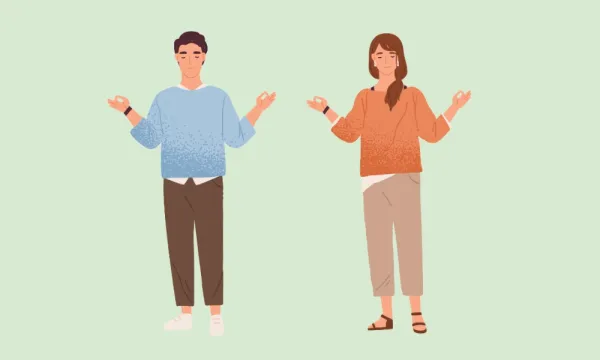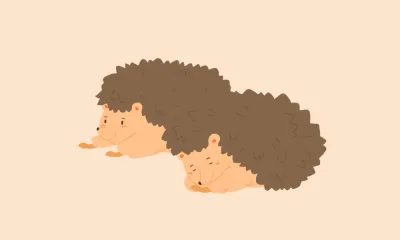Over time, every relationship settles into a comfortable and predictable rhythm. But what if you settle into unhealthy patterns of behavior instead of healthy ones? What if you constantly cycle through the same problems?
Unfortunately, simply rolling with the punches won't provide lasting change. You've got to address the cause of the dysfunction.
Because relationships are the sum of repeated behaviors and patterns, changing your dynamic is the only way to guarantee lasting change and a healthier, more fulfilling relationship.
So, what do you need to know about couple dynamics?
Things to know
- Couple dynamics based on a balance of power and repeated patterns of positive behavior make for a healthy relationship.
- Healthy couple dynamics include positive communication, attention, respect, and affection. These allow partners to love, value, and treat each other as equals.
- Unhealthy and abusive relationships are marked by couple dynamics with power imbalances, conflict avoidance, or conflict seeking.
Whether you're stuck in a rut or if you feel like your relationship has lost its spark, I've got you covered. Here's what we'll be exploring to help you get back on track:
- What Are Couple Dynamics?
- Power and Relationship Dynamics
- What Are The 5 Types Of Relationships?
- 8 Ways To Improve Couple Dynamics
- Sometimes It's Best To Walk Away
What Are Couple Dynamics?

Couple dynamics refer to the repeated patterns of interaction between you and your partner. What you say to each other and the non-verbal cues you send out are all part of relationship dynamics.
If our lives are shaped by the things we choose to do consistently, then our relationships are no different. The quality of your relationship is determined by what you and your partner repeatedly do.
The importance of couple dynamics
Whether you're in a casual relationship, civil union, or even a second marriage, understanding couple dynamics is a positive thing. Because romantic relationships are maintained through patterns, understanding couple dynamics puts you in a better position to navigate the challenges you experience as a couple.
It also tells you how to treat each other with compassion and affection for greater relationship satisfaction.
If you're aiming for a healthier dynamic, criticism, insults, and contempt should be avoided.
Power and Relationship Dynamics
If your goal is to have a happy, satisfying balanced relationship, knowing the difference between healthy and unhealthy relationship dynamics is important. A major indicator of a healthy relationship is a balance of power.
What is power?
Power refers to the ability of partners to exert control or influence within a relationship. In a healthy relationship, power should be divided equally between partners. This means that partners should feel respected for their individuality and feel free to express themselves. They should stay in the relationship not out of dependency or fear but because they love, value, and respect one another.
What is a power imbalance?
When one person has more power or influence over another in a relationship, a power imbalance is created. Power imbalances keep partners together either out of fear or dependency.
These relationships are not sustained by love and understanding but rather through manipulation, dependency, and coercion. In fact, most forms of abuse can be traced back to an imbalance of power.
Power in healthy couple dynamics

When it comes to intimate relationships, healthy dynamics are those that allow partners to be attentive, affectionate, and compassionate. Healthy relationships are the result of positive cycles and repeated behaviors or patterns that reinforce intimacy.
Healthy relationships don’t have a power imbalance, meaning both partners respect each other's role in the relationship. Communication is encouraged, and both partners are able to express themselves. Avoidance levels are low, so healthy couple dynamics allow for healthy conflict resolution.
Generally, healthy couple dynamics:
- Encourage free expression of each individual's internal world
- Foster respect and equality between relationship partners
- Encourage intimacy and security
- Discourage avoidance and other intimacy killers
- Allow for healthy conflict resolution
Power in unhealthy couple dynamics
Unhealthy relationships have a power imbalance and are characterized by patterns of negative or destructive behaviors. These behaviors result in tension, conflict, and, ultimately, lower levels of intimacy.
Communication is either limited or destructive, and partners aren't able to express their needs, wants, and feelings freely. Avoidance levels are high, so unhealthy couple dynamics don't allow for healthy conflict resolution.
Unhealthy dynamics can play out in a number of ways. In some pairings, one partner might be passive or avoidant. In some couples, one partner might dominate the relationship. In more toxic situations, one partner may be narcissistic or abusive.
Generally, unhealthy couple dynamics:
- Negatively impact mental health
- Involve conflict seeking and conflict avoidance
- Encourage emotional distance
- Create tense environments that discourage a sense of personal safety
- Force couples to develop a negative view of each other
- Amplify insecurities
What Are The 5 Types Of Relationships?

Understanding your power balance and how you relate to each other will empower you to make the necessary changes. Five different dynamics are described below. Which one describes your relationship?
Competing
This type of dynamic describes a never-ending power struggle. Partners are constantly at each other's throats, and tensions tend to run high. They're constantly in competition and argue about everything, i.e., their relationship, careers, and lifestyles.
Individuals caught in this dynamic tend to have strong opinions and views they try to impose on one another.
Codependent
While this dynamic tends to be less volatile, it is imbalanced as one partner takes the lead while the other simply goes along with everything. The partner who assumes responsibility for everything often overcompensated, and there's a strong tendency toward conflict avoidance.
Healthy relationships are all about reciprocation; without it, the partner in charge tends to experience burnout, frustration, and resentment.
Abusive
Abusive dynamics also involve an imbalance of power. One partner is dominant and seeks to be in control while the other partner complies, but only out of fear. The dominant partner is easily triggered, meaning emotional, verbal, and physical abuse is very common. The emotional atmosphere is tense, with the abused partner constantly living in a state of fear.
Disconnected

In this dynamic, a couple is emotionally disconnected, often leading separate lives. The relationship is boring with little conflict or tension. Often, this dynamic develops as a result of a loss of chemistry, distancing tactics, and conflict avoidance.
Sometimes life events like having children or simply aging can send a long-term relationship down this path, too.
Balanced
Of all the dynamics discussed, this is the healthiest one. A balanced couple relationship has a balanced power dynamic, and individuals are true partners. In a balanced dynamic, partners respect and support each other.
They value each other's differences and work together to build the life and relationship they desire. Balanced couples don't avoid conflict; they find healthy ways to work through it. Open communication is encouraged, and they share a healthy, intimate emotional connection.
8 Ways To Improve Couple Dynamics

A lack of intimacy is one of the leading causes of separation, divorce, and even infidelity. Negative patterns destroy committed relationships by causing a decline in emotional and physical intimacy.
Couples that choose to remain in unhealthy dynamics often develop mental issues, such as depression and anxiety. They may also suffer from chronic stress and experience a variety of physical ailments.
Healthy dynamics, on the other hand, lead to increased intimacy and relationship satisfaction. This, in turn, promotes well-being and longevity — two major benefits of meaningful relationships.
The good news is, while it's no easy fix, unhealthy dynamics can be improved with understanding and effort. A couple can learn the skills needed to make their relationship healthier. If you want to improve your couple dynamics, here's what you can do:
1. Acknowledge the state of your relationship
To change the current state of your relationship, you first need to accept that you and your partner share an unhealthy dynamic. It’s only when you’re ready to embrace change that you’ll be able to replace your negative cycles of behavior with healthier ones.
The next step involves figuring out the dynamic that exists between you. Doing so will give you a clearer picture of what behaviors you need to address. Are you overly dependent on your partner? Does your partner bully or control you? Perhaps after years of simply going through the motions, your relationship has simply lost its spark.
2. Change your behavior

Once you have determined your dynamic, you need to change your behavior and form new patterns of how you relate to each other. New patterns can only be formed when behaviors are reinforced consistently over time.
If you’ve taken on a passive role in your relationship, you need to get more involved. You'll need to show your partner that you value the relationship and that you can support them too. Offer to make plans or lighten your partner's load in any way you can.
If you feel the need to control your partner, it’s important to get to the root of the issue so that you can start to let go and give them freedom. Getting professional help and working through repressed emotions or childhood trauma might be beneficial.
If it feels like you’re roommates rather than lovers, it’s up to you to take the first step to rekindle your connection. Becoming the change you want to see might ignite a spark of attraction and set you on the path to re-connection.
If you are in a toxic situation where verbal, emotional, or physical abuse has become the standard, you may need to separate for some time and seek help.
3. Improve your communication skills
If you're aiming for a healthier dynamic, criticism, insults, and contempt should be avoided. Even when you are frustrated and have valid concerns, the key is to present them in a respectful way that honors your partner and preserves your relationship.
4. Practice active listening

Active listening refers to being attentive, considerate, and responsive when communicating with your partner. It’s about listening to validate your partner as opposed to simply providing a response. Active listening cultivates an environment where you'll feel safe expressing yourselves.
5. Respond to each other's bids
One way to change your dynamic for the better is to respond to each other's bids. A bid is a request for connection or attention. It can be as specific as you sharing something interesting with your partner or as vague as them reaching out for a hug after a long day.
How bids are made and how you respond to them can make or break your relationship. When you miss or respond negatively to each other's bids, you drift apart, and your relationship suffers. However, if you respond positively, your relationship is strengthened.
6. Verbalize your needs clearly
The challenge with bids is that often, they aren't that clear. They are also heavily influenced by the emotions driving them. For instance, unmet emotional needs and desires tend to come up as vague, verbal, or non-verbal expressions. When such bids are clearly expressed, they tend to come across as accusations, complaints, or criticism.
For example, instead of saying, ‘I miss spending time with you,’ you might say, ‘you never make time for me.’ While this is a genuine bid to connect, it comes across as an accusation and may result in an argument.
Missing or rejecting each other's bids may lead to damaging assumptions that can harm your relationship. Faced with constant rejection, you might come to the conclusion that your partner doesn’t care about you when that isn’t the case — your bids are simply getting lost in translation.
This is why it’s important to work on verbalizing your needs instead of trying to read each other’s minds. Besides being as specific as possible, bids should be expressed in a way that doesn't sound like a personal attack or criticism.
7. Express gratitude

The importance of appreciating each other can't be overstated. As human beings, we're born with a desire to be valued by those closest to us. When you appreciate one another, you fulfill this need. This creates a safe space where trust, respect, and intimacy can grow.
8. Get help
With the right help, you can change your dynamic. Couples therapy can be useful for identifying and resolving issues in your relationship. Unhealthy communication, toxic patterns of behavior, and imbalances can be addressed in the presence of someone impartial. Similarly, relationship and intimacy coaches can help you reconnect with your partner.
Sometimes It's Best To Walk Away
If you’re dealing with a narcissist or if you’re a victim of domestic violence, seek help — some dynamics are simply too toxic to salvage. Similarly, if a relationship is affecting your sense of well-being or making it difficult to cope with day-to-day life, it’s time to call it quits. Ultimately, if neither of you is willing to change your behavior or seek help, it's best to walk away.









